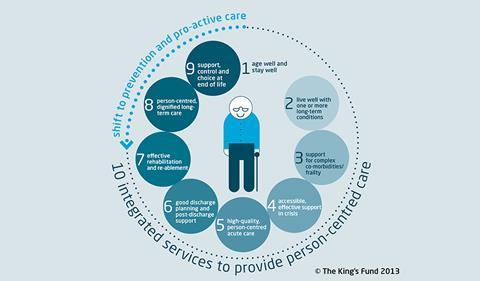With more people living longer than ever before, how can we transform our health and care services to meet the needs of the 21st century, ask Catherine Foot and Richard Humphries

Kings Fund, 10 components of care
In 1948, just over half of the population lived longer than 65 years; today, more than 85 per cent of us live at least that long and by 2030 one in five of us will be over 65. But our health and care services have failed to keep up with this dramatic demographic success story.
‘To redesign our services for older people, it is essential to look across all components of care’
Too often, NHS services are still designed around single diseases. And too many older people end their lives in hospital, when they are consistently rated worse than hospices and other end of life care settings by family members for treating their loved ones with dignity and respect.
How can we transform our health and care services so that they meet the needs of the people who use them in the 21st century? It is true that important improvements can be made within individual services – better access to specialist geriatric assessment for older people in hospitals for example, or training and support for primary care professionals in approaching conversations about end of life and advance care planning. But gains can be short-lived or limited because of the complex interdependencies that exist between different parts of the system.
To redesign our services for older people, it is essential to look across all components of care.
Ageing well
At the King’s Fund, working with our colleague (and HSJ commissioner) David Oliver, we have recently produced our report Making our health and care systems fit for anageing population, looking at each of the main components of care for older people (see illustration, above), reviewing the quality challenges that exist and summarising the evidence for what works, alongside examples of good practice and pointers to more detailed guidance.
This highlights the importance of joint working between health, social care and wider public services to support older people to remain healthy, happy and independent.
For example, Newcastle West Clinical Commissioning Group and Newcastle City Council have developed a shared “ageing well” strategy, which includes engaging older people as volunteers and health champions, case finding those at risk of deterioration or dependency to provide them with proactive support, and a focus on supported self-management.
Providing the right housing is also crucial in helping maintain independence. New housing stock needs to adequately reflect the needs of the local ageing population, with the right mix of extra-care and sheltered housing available. And providing aids and adaptations in people’s homes can aid recovery after hospitalisation and save long term care costs.
‘Efforts to achieve good care for older people are often bedevilled by fragmented services and responsibilities’
The correct use of the comprehensive geriatric assessment and specialist support at the right time is another key theme. Hospitals often deal with high numbers of admissions of older people unable to manage at home, presenting problems such as confusion and immobility. Full assessment is crucial to identify reversible medical problems, target rehabilitation goals and plan for discharge and post-discharge support.
Leeds Teaching Hospitals Trust has a 60-bed acute assessment unit for older people, providing assessments to facilitate and plan treatment and discharge. In 2010-11, this reduced lengths of stay for acute geriatric admissions by four days.
It has since appointed three consultant “interface geriatricians”, who link with the early discharge assessment team and help to communicate with primary care, refer to specialist clinics or community rehabilitation, review medication, and access social care assessment and support. In the first year, they have helped to reduce admission rates by 26 per cent among the high-risk group of older people that they have focused on.
Compassion, respect, dignity
A third crucial theme is the importance of treating older people with compassion, respect and dignity. University Hospitals Birmingham Foundation Trust has led the way on this by appointing more than 500 “dignity champions” across all groups of staff who care for older people, who work to share resources with colleagues, challenge poor care and advocate for patients and families. They use “all about me” documents to understand individual patient needs and preferences, offer support for carers including to stay overnight if needed, and have focused on making mealtimes social occasions with volunteers and china cups and saucers.
‘Marginal change will not be enough; service leaders will need to look beyond short-term deadlines and develop ambitious longer term visions’
Efforts to achieve good care for older people are often bedevilled by fragmented services and responsibilities. So the golden thread that runs through all nine components of good care is integration, in which care is coordinated around the needs of the individual so that they receive the right mixture of services in the right place at the right time. Frail older people and those with complex needs stand to derive particular benefit from integrated approaches.
For example, South Warwickshire Foundation Trust has worked hard with primary care, social care and voluntary sector partners to improve care pathways for older people. Many of the government’s 14 integrated care pioneers are focusing on the needs of the older people.
While the establishment of the £3.8bn better care fund will significantly increase financial pressures on providers, it is an important opportunity to drive forward integration and achieve better outcomes for older people. But marginal change will not be enough; service leaders will need to look beyond the fund’s short term deadlines and develop ambitious longer term visions for local systems. There is no shortage of bottom-up initiatives and innovations.
The challenge now is to disseminate these achievements and lessons learnt at scale and pace, so that the rest can become as a good as the best.
Catherine Foot and Richard Humphries are assistant directors, policy, at the King’s Fund


























2 Readers' comments